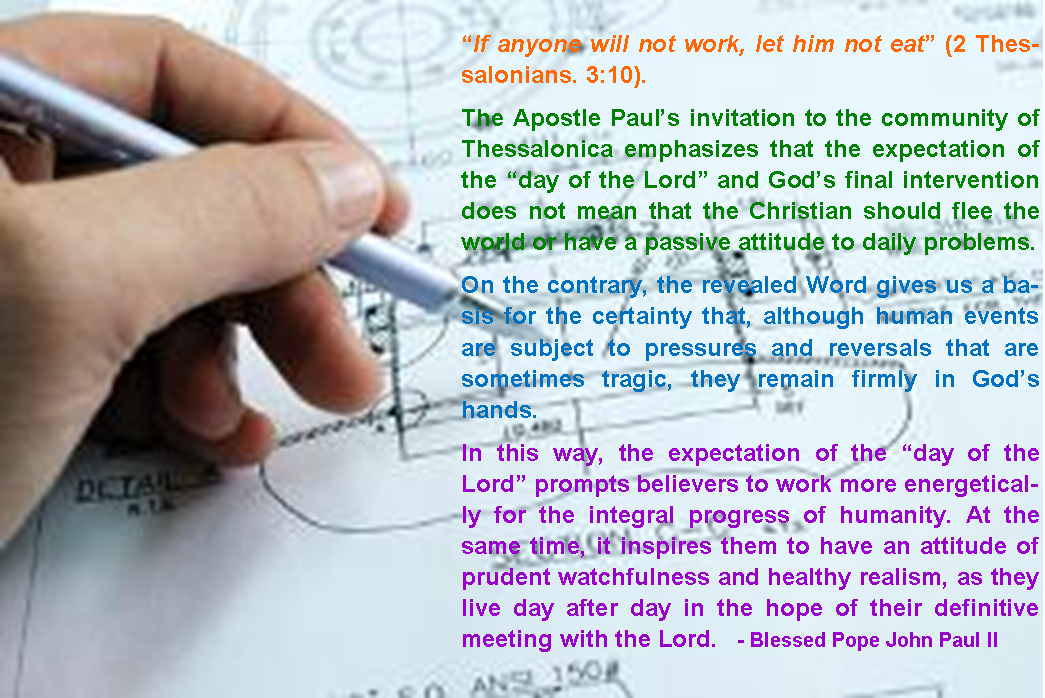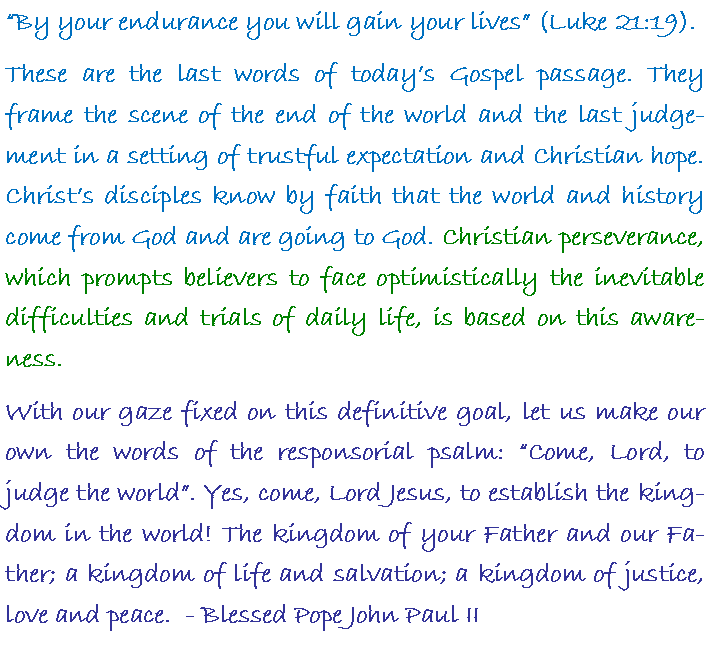|
84 |
|
Sharing:
It was the 33rd Sunday in Ordinary Time on 17 November 2013.
Here are the Readings that were read in the Eucharistic Celebrations all over the world on the same day (see previous page): 1st Reading: Malachi 3:19-20, Responsorial: Psalm 98:5-9, 2nd Reading: 2 Thessalonians 3:7-12 & Gospel Reading: Luke 21:5-19.
We have extracted the Homilies of Blessed Pope John Paul II, Pope Benedict XVI & Pope Francis I based on the aforesaid Readings to share with you, so that you could similarly be encouraged: |

|
PASTORAL VISIT TO THE PARISH OF ST MATTHEW IN ROME EUCHARISTIC CELEBRATION HOMILY OF HI HOLINESS JOHN PAUL II Sunday, 15 November 1998
1. "Watch therefore, for you do not know on what day your Lord is coming” (Matthew 24:42, 44).
These words from the Gospel acclamation help us to understand better the meaning of the present liturgical season. We are now approaching the end of the liturgical year and the Church invites us to consider the recent events of life and history.
The biblical readings we have just heard present the waiting for Christ’s second coming in the vivid expressions of the prophet Malachi, who describes the “day of the Lord” (cf. Malachi 4:1) as God's sudden and decisive intervention in history. The Lord will definitively overcome evil and re-establish justice, punishing evildoers and bringing with him the reward for the righteous.
In the final perspective of the world, the invitation to be ready, proclaimed in the Gospel acclamation, is all the more pressing. The Christian is called to live with a view to meeting Christ, constantly aware that every day he must contribute, by his own efforts, to gradually establishing the divine kingdom.
2. “If anyone will not work, let him not eat” (2 Thessalonians. 3:10).
The Apostle Paul’s invitation to the community of Thessalonica emphasizes that the expectation of the “day of the Lord” and God’s final intervention does not mean that the Christian should flee the world or have a passive attitude to daily problems.
On the contrary, the revealed Word gives us a basis for the certainty that, although human events are subject to pressures and reversals that are sometimes tragic, they remain firmly in God’s hands.
In this way, the expectation of the “day of the Lord” prompts believers to work more energetically for the integral progress of humanity. At the same time, it inspires them to have an attitude of prudent watchfulness and healthy realism, as they live day after day in the hope of their definitive meeting with the Lord. |

|
3. Dear brothers and sisters of St Matthew's Parish in Morena! As I continue my Pastoral Visits to the Roman parishes, God’s Providence has brought me here today, to the border between the Dioceses of Rome and Frascati. Geographically, your parish is located in an area which is far from the Pope’s home, but it is not so from the standpoint of ecclesial affection and communion. Moreover, like every parish community, it is very close to me and it is a great joy for me to meet you on this happy occasion.
I greet you all with warm affection! First of all, I greet the Cardinal Vicar and the Vicegerent, who has direct responsibility for pastoral ministry in the Eastern Sector of the Diocese to which this community belongs. I next greet your parish priest, Fr Pedro Martínez Pedromingo, and his co-workers, the priests who belong to the Identes Missionaries. I extend my cordial thanks to them for their generous ministry in this parish over the past five years.
I extend a special greeting to the Parish Handmaids of the Holy Spirit, who, by their presence, witness and pastoral assistance, make a valuable contribution to your community. I also greet the members of the numerous parish groups and all who in various ways are involved in evangelizing this area. In this regard, I must mention specifically the missionaries of your parish involved in the City Mission.
With regard to the City Mission, on Sunday, 29 November, in the Vatican Basilica, during the Eucharistic celebration for the opening of the third year of preparation for the Great Jubilee of the Year 2000, God willing I will have the joy of conferring their mandate on the men and women missionaries of the Diocese, so that they can go to proclaim the Gospel in the various contexts of the city's life and work. In this significant celebration, during which the Bull of Indiction of the Holy Year will be promulgated, I will have the opportunity to give them the crucifix they will take to each of these places.
The proclamation of God the Father’s love, fully revealed in the Death and Resurrection of Christ, knows no boundaries of space or time. Through the City Mission this proclamation must resound in every corner of the Diocese, because the Gospel is meant for all people; it is the message of salvation to be proclaimed always and everywhere.
4. As I wrote in the Apostolic Letter Tertio millennio adveniente, in the third year of immediate preparation for the Jubilee of the Year 2000, “if we recall that Jesus came to ‘preach the good news to the poor’ (Matthew 11:5; Luke 7:22), how can we fail to lay greater emphasis on the Church’s preferential option for the poor and the outcast?” (n. 51). I am therefore pleased with you, dear parishioners, that you would like to create, especially starting this year, a volunteer service which responds more and more adequately to the needs of the less fortunate residents in your neighbourhood. I am referring especially to the elderly, to families who have lost the joy of living together, to the children and young people who do not have sufficient or suitable spaces for recreation.
With regard to young people, I must recall the World Youth Day which the Diocese of Rome will host in August of the Year 2000. I am certain that for you, as for every other parish, it will be an opportune occasion to reinvigorate your youth ministry and to increase the entire Diocesan community’s attention to the younger generation. I hope that from now on all the parishes, religious institutes, Catholic schools, other ecclesial structures and families will make an effort to welcome the many young people who will gather in Rome for that significant event. |


|
5. “By your endurance you will gain your lives” (Luke 21:19).
These are the last words of today’s Gospel passage. They frame the scene of the end of the world and the last judgement in a setting of trustful expectation and Christian hope. Christ’s disciples know by faith that the world and history come from God and are going to God. Christian perseverance, which prompts believers to face optimistically the inevitable difficulties and trials of daily life, is based on this awareness.
With our gaze fixed on this definitive goal, let us make our own the words of the responsorial psalm: “Come, Lord, to judge the world”. Yes, come, Lord Jesus, to establish the kingdom in the world! The kingdom of your Father and our Father; a kingdom of life and salvation; a kingdom of justice, love and peace.
Amen!
PASTORAL VISIT TO THE ROMAN PARISH OF ST ALESSIO HOMILY OF JOHN PAUL II Sunday, 18 November 2001
1. "By your perseverance you will save your souls" Luke 21,19. We have just heard the words that express the spiritual message of the Liturgy of the Thirty-Third Sunday of Ordinary Time.
While we are coming to the close of the liturgical year, the Word of God invites us to recognize that divine Providence governs and directs the last events of history. In the first reading, the prophet Malachi describes the day of the Lord (cf. Malachi. 3,19) as the decisive intervention of God, that brings about the defeat of evil and the establishment of justice, by punishing the wicked and rewarding the just. More clearly yet, the words of Jesus, that St Luke reports, take away from our hearts every kind of fear and anguish, opening us to the consoling certainty that the life and history of humanity, despite numerous tragic setbacks, remain firmly in God's hands. The Lord promises salvation to the person who puts his trust in him: "Not a hair of your head will perish" (Luke 21,18). |

|
2. "If anyone will not work, let him not eat" (II Thessalonians 3, 10). In the second reading, St Paul teaches that, to prepare the coming of the Kingdom of God, believers must take seriously their vocation and, in view of deviant interpretations of the Gospel message, the Apostle vigorously recalls the concrete need to be busy working. With an energetic comment, the Apostle singles out for condemnation the inactivity of those who claim that the Day the Lord was close at hand and, as a result, gave way to a spirit of inaction and evasion instead of living and readily witnessing to the Gospel.
He who believes, must not behave like that! But he must work in an ongoing and conscientious way, eagerly awaiting the definitive coming of the Lord. Here is the correct life style of the Lord's disciples that is brought out in the chant before the Gospel: "Watch and be on guard, because you do not know on what day the Lord will return" (cf. Matthew 24, 42. 44).
3. My dear parishioners of St Alessio at the Case Rosse, thank you for your warm welcome. I cordially greet the Cardinal Vicar and the Auxiliary Bishop of the Sector. I greet your active parish priest, Don Giancarlo Casalone, the parochial vicar, those who belong to the parish and those who live in this neighbourhood.
I am happy to celebrate Mass in your new and beautiful parish church. Thanks be to God and to the generous contribution of the Vicariate, of your priests and of many persons of good will, that, after about 20 years, your community now has an adequate parish complex. I am sure that it favours the identity and growth of the community and its apostolic activity in this area. It is important to have a place to come together to pray, to receive the sacraments, and to establish relations of friendship and fraternity. In this way, it is easier to form the children, to meet with young people, to help families and support the elderly. The parish creates the spirit of acceptance and of solidarity which our world needs so much.
Continue next page ...
24 November 2013
|